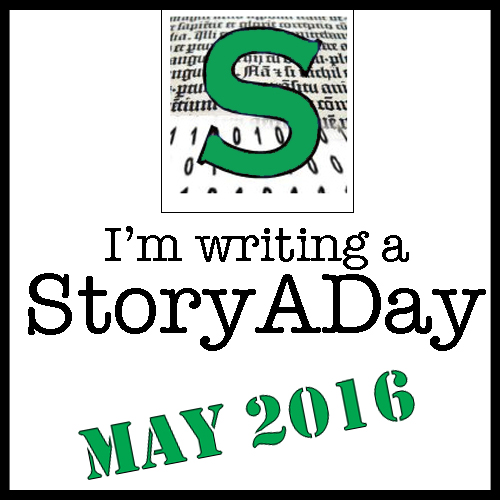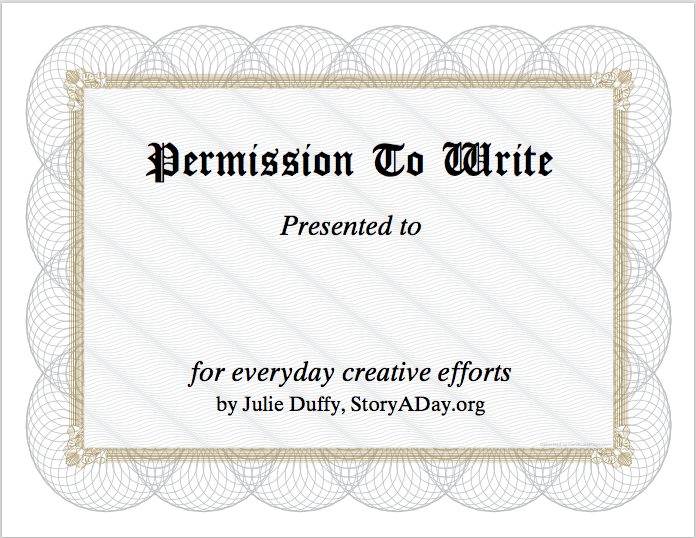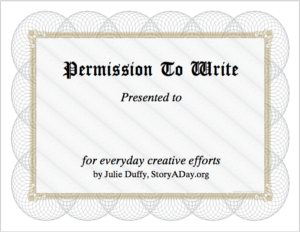[500px x 500 px]
How Do You Write A StoryADay?
Listen to me and Gabriela Pereira of DIYMFA run through all the tips, tricks and really great reasons to give it a shot.
Her podcast, DIYMFA Radio is a great listen. If you’re not subscribed yet, you should!
I Hereby Grant You Permission To Write
In the middle of the 20th Century “Art” because professionalized, to the point where we felt we didn’t deserve to tell stories unless a New York publishing house was slapping it between hardcovers, or an overpriced university program anointed us “Writer, MFA”.
This was an aberration; a moment in history that did not exist before and does not exist now.
Humans have always sat around and told each other stories, without the benefit of editors or tutors or anyone giving us permission. We told stories to audiences, and we gauged their reaction in order to make our stories better next time.
The success of the “amateurs doing things on TV” genre (American Idol, The Voice, Dancing With The Stars) along with the boom in indie publishing, indie movie making, indie everything making, are signs that the artificial workshop of creative professionals is over. Humans are taking back control of our own creativity.
Are you?
Tell your stories. Show them to people. Make them better. Write new stories.
That’s all there is to it.
You have every right to write. In fact, print out this certificate and write your name on it.
There. You have my permission to write.
Can you give yourself permission to write?
What Are The Last Three Books You Read?
Sometimes, when it’s hard to pick a writing project, it can be useful to take inspiration from other authors.
Sometimes, it’s good to review what kinds of books we’re reading and ask whether or not they are helping us in our writing.
Sometimes, it’s just fun to challenge our friends.
So here’s my challenge to you: tell me about the last three books you opened
(Not your favorite books, not books you wanted to read, not books you think will impress me. What books did you open? And yes, this can be in ebook, audio or picture book form)
Share your #last3books on your blog or social media and/or in the comments below. Then post this challenge to your friends.
Magnificat Year of Mercy Companion
This is part of my challenge to myself to read a spiritual meditation every morning. I hope that this will continue all year (and if it does, I may ‘retire’ it from this list.)
A mixture of personal stories, poetry, reflections on scripture, lives of the saints and litanies, it’s a positive way to start the day. It makes me less selfish.
The Lies of Locke Lamora by Scott Lynch
I’m switching back and forth between the ebook and the audio version, because a, it’s looooong, b, it’s huge fun, and c, the narrator, Michael Page, is fabulous.
Set in a densely realized fantasy world, centered in one city, but so deeply developed that I have confidence there’s a whole universe around it. Locke Lamora is a lovable rogue, who, with his gang ‘The Gentleman Bastards’, tries to pull of the biggest scheme of his life and ends up in more trouble than even he could ever have imagined. There is magic in this universe but it is expensive, therefore it is sparely, which makes me happy. I prefer relatable tales of people getting in and out of scrapes on their own wits and training.
It’s an incredible feat, especially for a debut novel. The language is rich and earthy and witty (like Neil Gaiman and Terry Pratchett’s lovechild, if it had been abandoned and raised in a gutter). It is long though. I kind of wish it was a series of three shorter books, so I could enjoy one, put it down and sigh, and then look forward to he next one. There’s certainly enough story there, for that. But that’s not the choice they made, so I’ll be picking this on up for some time to come.
Unstoppable by Bill Nye
In spite of the negative connotations of the title, Bill Nye’s book about the mess we’ve made of our planet is far from a downer. In fact, the “Unstoppable” force he’s referring to is not climate change, but us: humanity.
With his trademark chatty tone and irrepressible optimism, he points out all the problems we face and encourages the next generation to be bold, and believe that they can come up with solutions, if only they care enough.
Great read.
So, those are the last three books I opened. What about you? Leave a comment!
Don’t forget to share the challenge. Here are some updates you might use:
What are the last three books you opened? Take the #Last3BooksChallenge https://storyaday.org/last–3-feb
Dare to share the last three books you opened? Take the #Last3BookChallenge http://storayday.org/last-3-feb
Beyond Word Count – Other Ways To Log Your Writing Progress
I’ve made a case for logging your word count to keep yourself accountable, to give yourself a pat on the back, to encourage consistency and good writing habits.
But it doesn’t have to be word count.
WHEN WORD COUNTS HELP
Setting a word count goal makes sense if you’re working on a novel and want it finished by X date.
It also makes sense if you want to become a faster writer.
WHAT IF THAT DOESN’T WORK FOR YOU?
It might not make sense to set a word count goal if you’re still struggling to create a writing habit. Or if you’re writing flash fiction.
And what if you’re int he editing (or marketing) phase of a project, but still want to feel productive?
In these cases, you might want to to track the number of days on which you worked, to see how your writing practice is becoming part of your life.
HOW TO LOG YOUR DAYS
Set a goal for the number of days a week that you will Write Something (or Work on Project X).
- Use the ‘butt in chair” column or the “hours spent editing” column in your StoryADay Writing Log.
- Any day when you work, just type the number for the time spent, in that new column.
- If you want to get fancy — set up conditional formatting to turn the cell green when it finds that text in the field).
If you like to keep your logs in a more tangible form:
- Buy a discounted calendar just for your writing log (you can find them in abundance in January!).
- Throw in a packet of cute stickers (gold stars are great, but you can pick ones that match your personality).
- Decorate your calendar with a sticker every day you write.
At the end of the month, step back and gaze at the ‘heat map’ of your work progress. Hopefully there’ll be enough ’stickered’ days to make you smile. If not, make a commitment now to do better next month.
KEEPING YOUR GOALS REALISTIC
If you can make an unbroken chain of those days that’s great. But bewarE! Setting so high a bar can backfire. What happens the first time life gets in the way and you miss a day? You feel terrible. You get demotivated. You quit.
Rather, I’d suggest setting a goal to write on a certain number of days a week.
WHAT TO DO WITH THE INFORMATION
At the end of the month, look back at your log see how much you achieved and if any patterns emerge (are weekends good or bad for you? Do you write more when you’ve had more sleep? When the kids are in school?). You can see where you might make changes or improvements.
NO GUILT
Again, try to not use the log as a weapon to bludgeon yourself with guilt. Use it to analyze and study (and to face) what’s really going on. Try to increase your goal a little from what you actually achieved this month (not some abstract and possible unrealistic ‘ideal’).
Whatever type of log you choose, use it to keep yourself accountable, spur positive changes, and reinforce good work habits.
Because all of these things get you closer to where you want to be: writing.
Are you logging your writing days or word count? What methods do you use, and how do you use it to help you progress? Share in the comments, below!
How I Used Word Count Tracking To Write 100,000 Words
How I used the StoryADay Word Count Logging tool to write 100,000 words last year, and why you should be logging your progress too!
Audio Player
Do you log your word count?
I’ve been logging my word count (on and off) for the past couple of years. Last year, without really trying too hard, I managed to write 100,000 words of fiction. That was the end of one novel, several short stories (a couple published) and the first half of a second novel.
If I’m so productive, why bother logging my word count, you say?
Come closer and let me whisper into your ear…I’m productive because of the word count log.
Here are four ways logging my progress helped me meet my goals: Continue reading “How I Used Word Count Tracking To Write 100,000 Words”








